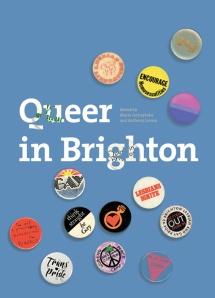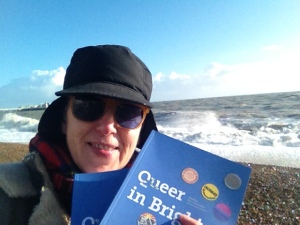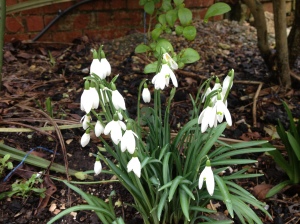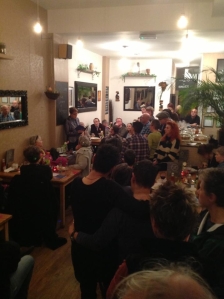Words are powerful. They change meanings, connotations as language evolves. The goddess Trivia was clearly demoted. If you remember saying ‘straights’ to mean cigarettes (rather than joints) you are probably over 60. If you ever said sick to mean good, well below. I remember correcting students who said ‘coloured’ instead of Black. They thought Black was rude, didn’t want to offend.
When I was growing up ‘queer’ was an insult word for gay men. Women (and some men) I know still balk at using it. Most younger people I know prefer it to saying gay or lesbian. My friend, poet John McCullough wrote a wonderful essay for Queer in Brighton‘s anthology exploring and celebrating the word queer for its inclusivity and subversive quirkiness. The lengthening list of letters to describe the LGBTIQ community has amused and irritated people both on the outside and inside of the community. But when you are in a minority or seen as ‘other’, language and being able to name your experience in your own way (rather than being told what you are by someone else) is especially important. You have to fight to be recognised and you’re seldom in a position to take your identity for granted.
 I recently went to see the exhibition about the life and work of 20th century artist Gluck at Brighton Museum. One of the things that struck me is how different groups and communities have claimed Gluck. As someone who wore tailored ‘masculine’ clothes, with cropped hair and who had (quite a few!) relationships with other women she became a lesbian icon. More recently “a trailblazer of gender fluidity” for the Trans community. I couldn’t help wondering what she herself would have made of these legacies.
I recently went to see the exhibition about the life and work of 20th century artist Gluck at Brighton Museum. One of the things that struck me is how different groups and communities have claimed Gluck. As someone who wore tailored ‘masculine’ clothes, with cropped hair and who had (quite a few!) relationships with other women she became a lesbian icon. More recently “a trailblazer of gender fluidity” for the Trans community. I couldn’t help wondering what she herself would have made of these legacies.
I love how many younger people (though not exclusively, think American writer Eileen Myles,) are rejecting or questioning gender stereotypes by appearance or pronouns to describe themselves. At the same time I think it’s crucial not to gloss over the misogyny (from the Greek, hatred – no less – of women) in society. It’s not a level playing field from which we choose equal options. As an older feminist I’m heartened seeing young women (men, everyone) take up campaigns about sexual harassment, male violence, economic inequality. I’m also gutted that we still need to.
So maybe that is something to do with my relationship to the word lesbian.
 I love the inclusivity (now) of queer and at the same time I mistrust general words. It’s too easy for women to get lost – be made invisible in them (since men are – still – the default, women the other). Also I have a soft spot for the word lesbian. Maybe it’s what was current when you first come out – like the affection you have for music you grew up with – which makes you embrace a particular word. It’s got limitations as a Western/Eurocentric word – ancient Lesbos being the birthplace of Sappho, but it makes me happy that she was a poet as well as a woman loving women. It also suggests an exclusivity (of only relating sexually to women) which actually doesn’t apply to lots of lesbians’ experience. But there’s something uncompromising about a word that is so much about being a woman. I can still remember how arresting it was to hear it and start using it myself. And all the times I heard any woman standing up for herself get ‘accused’ of being a lesbian, her opinion dismissed. I asked a friend who is around 20 years younger than me how she referred to herself, what she felt about the word lesbian. She said she calls herself queer or gay and – to my surprise, since I expected her to think its power had long worn off – she said the word lesbian packed a punch, so she would reserve it for confrontations rather than casual conversation.
I love the inclusivity (now) of queer and at the same time I mistrust general words. It’s too easy for women to get lost – be made invisible in them (since men are – still – the default, women the other). Also I have a soft spot for the word lesbian. Maybe it’s what was current when you first come out – like the affection you have for music you grew up with – which makes you embrace a particular word. It’s got limitations as a Western/Eurocentric word – ancient Lesbos being the birthplace of Sappho, but it makes me happy that she was a poet as well as a woman loving women. It also suggests an exclusivity (of only relating sexually to women) which actually doesn’t apply to lots of lesbians’ experience. But there’s something uncompromising about a word that is so much about being a woman. I can still remember how arresting it was to hear it and start using it myself. And all the times I heard any woman standing up for herself get ‘accused’ of being a lesbian, her opinion dismissed. I asked a friend who is around 20 years younger than me how she referred to herself, what she felt about the word lesbian. She said she calls herself queer or gay and – to my surprise, since I expected her to think its power had long worn off – she said the word lesbian packed a punch, so she would reserve it for confrontations rather than casual conversation.
Poets seek to name the impossible, the just-out-of-reach. Those from minority/disadvantaged groups look for words to name that which is sidelined, excluded. Words do and don’t matter. Lesbian – not a word to hide in.







